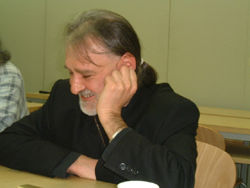|
Werckmeister Harmonies Tarr Bela (Director) |
 It's been five years since the deep, enormous shock of 7 hours and a half known as Satantango profoundly moved the audience at both the Tokyo and Yamagata International Film Festivals in 1995. Now, Tarr Bela's new film will at long last be screened in Japan.
It's been five years since the deep, enormous shock of 7 hours and a half known as Satantango profoundly moved the audience at both the Tokyo and Yamagata International Film Festivals in 1995. Now, Tarr Bela's new film will at long last be screened in Japan. Werckmeister Harmonies is "a film about how harmony cannot exist in this world," says Tarr. "Everything that we call civilization means the destruction of pre harmonies of sound." Protagonist Vakushka is "an innocent person. He goes through this world without realizing its atrocities and cruelties. The only thing he can relate to is the universe. The cosmos and eternity are the only things with which he can measure the world. Mr. Esther, another character, is only interested in pursuing the pure perfect harmony of sound. What happens to those humans who can only be pure and innocent?" Thus Tarr describes the story of this film. "But I don't like to talk about generalities"--saying this, the director warns against interpreting the film's theme as political or abstract. "The world must be something more concrete. The only thing I am trying to do is to show the destiny that awaits my characters. If the audience can love those people, then they will be able to live their tragedies as their own. That is as much as I want to do, nothing more." The characters populating Tarr's film are prisoners of the world in which they live. Their community ends up with a violent eruption of mass hysteria. However, this certainly is not just a reflection of Hungarian society having been under communist regime and so on."If you ask a question, and I can only answer yes or no, I'm not free. Freedom [belongs to those] who ask the questions. This is the main problem of democracy. Because in all democratic systems, everybody just asks you questions. You only have the choice to vote or not, that's all. I don't think that is a real freedom. Freedom is very different". As for himself, "I think I am free," says Tarr. "Of course I depend on a lot of things, on money, on the market..... But if I can't do what I want, I just don't do [the film]. I am free to be hungry, you know(laughs)". It took him six years to make this film. Those six years, Tarr acknowledges , were the price of his freedom. "It was very difficult, [those] six years... For two years we just looked for the money, after that I spent one year location- hunting, and when we started shooting, the movie was not yet financed in whole. So we just shot something, then the money was gone, we looked for other funding and we started again, then we had to stop again, look for more funding.... We had seven cameramen, and a lot of.... (laughs) difficulties, of course." When Krasznahorkai Laszlo, also the author of the novel on which Satantango was based, sent him his new novel The Melancholy of Resistance, Tarr's initial reaction was "I told him it was a damn good novel, that's all. I didn't think of making a film. But when I met Lars Rudolph in Berlin. I thought, 'This guy is Valushka.' So you can say that this is his film." The acclaimed international cast also includes Peter Fitz as Mr. Esther, and Hanna Schygulla as his ex-wife. "Schygulla had not acted in films for nine years. But there was a retrospective of my works in Paris, she saw it, and said 'I thought I would never make films with anybody anymore, but [I would] if it were with this [director] Tarr.' So I contacted her." "My films must be seen on a big screen" says Tarr. "For me, cinema is not just story. Or the story of a film does not take place just between the characters. The picture, the various sounds, the look in people's eyes, the scenery--everything that surrounds us makes cinema. Cinema flourishes only when there are details. You have to make every dimension of a film able to be experienced." "I want you to love the people up on the screen." This is Tarr Bela's message to his audience. "And as they destroy themselves, I want you to live their catastrophe with them (laughs). Of course, that catastrophe is also inevitable for myself. If you want to make films like mine right and in complete honesty, the director must also end up in hell." Toshi Fujiwara Film Critic
Director's Profile: Born in Hungary in 1955. Graduated from the Hungarian Academy of Theatre and Film in Budapest in 1981. Since 1981, employed by MAFILM. From 1979 to 1980, a member of the direction committee of the Bela Balazs Studio in Budapest, a film studio for young filmmakers. Since 1990, has worked as a visiting professor at the Film Academy in Berlin and has been a member of the European Film Academy since 1996. |